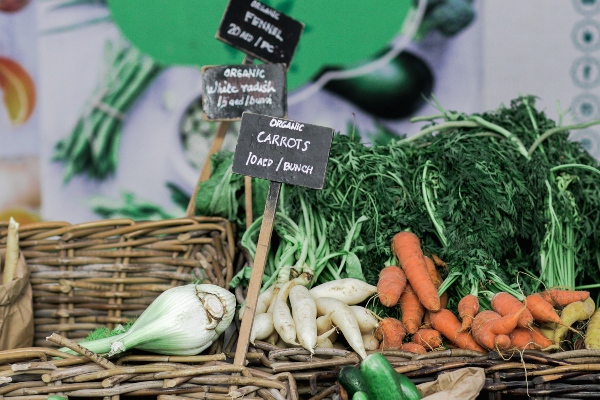Would you call this a vegetable tube? asked BBC News at the start of June, 2019. This was in response to an EU proposal that came two months earlier in April. The EU Parliament’s Agriculture Committee suggested a ban on vegan and vegetarian versions of traditionally meat made foods being termed as ‘veggie’ burgers or sausages. Instead, the Committee suggested that the questionably appealing, though accurate terms, “veggie discs” and “vegetable tubes”would be more appropriate.
This recommendation has been met with concerns from European vegans, vegetarians and food suppliers alike, with many questioning why this move was needed and what the consequences would be.
Why Does The EU Want New Names For Meatless Foods?

During an interview with The Guardian, French MEP, Éric Andrieu, said that there had been much debate, in France, Europe and indeed around the world, about protecting the history of meat products and being clear with consumers about exactly what they are getting. He is quoted as saying: “People need to know what they are eating. So people who want to eat less meat know what they are eating – people know what is on their plate.”
This proposed ban isn’t the first of its kind and it isn’t a concern only for the EU. In fact, in Mississippi, USA, a ban on meat names for plant based alternatives was put in place on 1 July 2019 . Similarly, Canada has been debating the use of the term ‘cheese’ for dairy free products.
The argument from the EU is that adding ‘veggie’ to the front of ‘burger’ isn’t enough to make it clear to consumers that they aren’t eating meat. Yet, there aren’t any reports of these complaints from actual consumers themselves. In fact, a spokesperson for Plant Based News said ‘The [UK’s EU Energy and Environment Sub-Committee] heard no evidence that consumers had felt they were misled by meat-free products and less than four per cent of people had ever unintentionally bought a vegetarian product instead of a meat-free version’.
Generate the CSS stylesheets for border radius, fonts, transforms, backgrounds, box and text shadows with the online CSS code generators.
What Food Names Would Actually Be Banned For ‘Free From’ Alternatives?
There is a relatively small group of words that would be stopped from being used for vegan and vegetarian versions of meat products, should the ban be applied. Specifically, they are:
- steak,
- sausage,
- escalope,
- burger and hamburger.
July 2019: The UK’s House Of Lords Responds

Although the European Parliament Committee approved this proposed ban, it isn’t in effect. In fact, it has to be voted on by the Council of the European Union first before it is brought into force. In the UK, The House of Lords’ EU Energy and Environment Sub Committee heard evidence from farmers and vegan/vegetarian groups in the UK and found that not only was the proposed ban deemed unnecessary, but also that it could actually cause more clarity issues for consumers. They also argued that it could result in deterring consumers from trying plant based foods, adding new issues for the food sector as a whole – which is already undergoing serious change thanks to climate change and trends towards ‘free from’ foods in recent years.
Would Brexit Mean The UK Doesn’t Need To Adopt Any New Names?
Brexit has not yet been agreed, which means that although the UK may not have to take on this policy, at the moment it has to be considered a possibility. Until the UK actually leaves the EU, it will still have to follow the rules by which we are currently held.
Even after Brexit, although the UK will not have to take on the policy of new names for meat free products, UK food businesses will need to be aware of any EU rules if they are exporting products to any Eurpean countries and make adjustments to any terminology or labelling in line with those rules. Read on to see which areas of your business could be affected.
For now, it is a wait and see process for the EU, UK and food businesses everywhere. We’ll be following too and will provide updates when they appear.
3 Consequences Of The EU Name Change For Food Businesses

The proposed name change from ‘burgers’ to ‘discs’ is more than just unappealing, it could have a serious financial effect on food businesses. The name change could mean that you lose customers who are looking for particular terms and, not seeing them, they might not choose your food product.
1. You Would Need To Change Your Food Labels, And Possibly Your Brand Name
Food business costs would also increase with the ban in place due a change in labelling requirements. A significant name change like this would mean that all packaging, possibly even some branding, for any food business using meat free alternatives, would have to be replaced. That would come at a great cost to a food business and would be especially damaging to the profits of a small business or startup.
2. Your Website And Online Visibility Would Need Updating
Then there is the search impact. Google and other search engines are vital for food businesses to find new customers. But how do you market to a customer searching for a “veggie sausage” when you are banned from using those words? Food businesses would also then be reliant on search engines catching up with the name change and offering accurate results for users, which could take some time, resulting in a reduction in sales while it gets figured out.
3. Training Staff (And Your Customers) In New Terminology
Thinking about the consumer, the name change could cause confusion for someone looking at a pub menu and wondering what a sweet potato and sweetcorn disc might look like. Staff in a restaurant can explain in person, as laborious as that sounds, but what about when your food business can’t be there?
Food Business Should Keep An Eye Out, But Don’t Worry Yet
Any food business should be keeping a close watch on any news around this change, as well as how/when/if Brexit occurs and the impacts of this change. You can take heart however that it seems most of those providing evidence are against this change, which is seen as unnecessary by both consumers and providers. Hopefully, therefore, this ban won’t come to pass, in which case food businesses won’t have to suffer. But it can’t hurt to think about your contingency plan, should the ban go into effect.